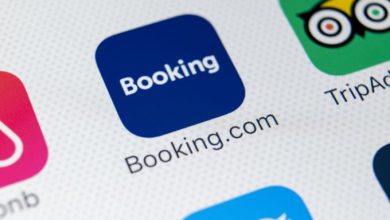
UPDATE: Booking.com responds to accom concerns about ‘nefarious’ brand hijacking
Ross Forbes-Stephen was sailing smoothly with his accommodation business on the West Australian coast when he says he was attacked by pirates.
He is now calling for Federal legislation to be strengthened to outlaw the practice he calls “brand hijacking’’ in which online travel agents take over a property’s name for their own google listings.
UPDATE: Booking.com responded to our request for comment this week with the following statement:
Everything we do is in the spirit of not just giving customers access to the best accommodation options at great prices, but also bringing guests and incremental business to our accommodation partners, particularly as we support the continued recovery of domestic travel in Australia. Search engines are open platforms where any business, including properties of all sizes, can pay to advertise. With a choice of different marketing channels to reach potential customers, the properties that choose to list on Booking.com are able to do so at absolutely no charge. We then invest in advertising to help them capture as much customer demand that exists in order to grow their businesses, ultimately helping to keep the larger travel ecosystem thriving over the long-term, including in Australia.
Mr Forbes-Stephen has been running the self-catering apartments at Cable Beachside Villas in Broome for 13 years but says the winds of change are blowing fiercely in a storm created by OTAs.
Following our recent article on rate parity, he wrote to Accom News to complain about brand hijacking which he says should be illegal in Australia. He has also complained formally in seeking help from Federal Opposition leader Anthony Albanese.
He says guests searching for almost any accommodation property by name will be presented with four or five “advertisements under that property name for booking.com, Expedia and others but the property’s real web page listing will be halfway down the results – too far for anyone to look’’.
“These OTA ads are displayed in such a way that the unwitting consumer clicks on the link, thinking they are going direct to the property website, but are instead being syphoned off to an OTA where the property page is displayed and the booking is funnelled through the OTA.
“This is a huge problem that has been made illegal in several European countries, but is not being addressed at all in Australia.’’
He said there was no point in industry watchdogs telling customers to book direct with a property if they couldn’t find that property with a simple google search or if it was lost among the commission-hungry OTA ads for that property.
“Brand hijacking has been going on for years,’’ he said. “It’s a very important issue for accommodation operators.’’
Mr Forbes-Stephen said he first became aware of the practice a few years ago “when booking.com started it’’.
“I was getting calls from people saying they’d made a booking on my website when they’d in fact made a booking through booking.com,’’ he said.
“At the same time our direct bookings dropped to about 50 per cent and our traffic through booking.com went up like mad. Then [another OTA] started doing the same thing.
“It doesn’t happen to big businesses like the Hilton because they have the financial clout to tell the OTAs to get stuffed.
“I tried to compete with them by running a campaign with google ads but I couldn’t beat them using keywords because it was too expensive.’’
Mr Forbes-Stephen said when he started at Cable Beachside Villas in 2007 “there was hardly any online booking’’.
“Our business didn’t even have its own online booking page. It was just the start of channel managers coming online,’’ he said.
“Travel agents had booking websites but we still used to get a phenomenal number of phone calls from them checking availability.
“That changed in the first two years here. By 2009 we were fully online and phone calls dropped from 30 a day to 10.
“Everything worked quite well, more than half our bookings were direct bookings.
“But there has been a steady progression down.’’
Trevor Rawnsley, the Chief Executive Officer at the Australian Resident Accommodation Managers Association, said the practises of brand hijacking and redirecting were “nefarious tricks’’ by OTAs that made his blood boil.
He said pursuing legal action over the practice was tough, though, given the OTAs were based overseas.
“We’ve tried reaching out to them but can’t get anywhere because the OTAs always blame head office, be it in Dublin or Zurich or elsewhere,’’ he said.
Grantlee Kieza OAM has won three Queensland Media Awards, two Australian Sports Commission Awards and has been a finalist for the Walkley and News Awards and for the Harry Gordon Award for Australian sports journalist of the year. In 2019 he received the Medal of the Order of Australia for his writing. You can find more of his work in our AccomNews & Resort News print magazines.
He has written 22 acclaimed books, including bestsellers Hudson Fysh, The Kelly Hunters, Lawson, Banks, Macquarie, Banjo, Mrs Kelly, Monash, Sons of the Southern Cross and Bert Hinkler.








You are spot on Ross.
I have approached our local tourist association, and QTIC about the OTA’s dominance over us smaller operators. Suffice to say they are not interested.
My suggestion was for our State or Federal Govt to do a huge advertising campaign asking holiday makers to book direct. All tourism operators would benefit from a campiagn like that and save 15% commission that would mostly go overseas to booking.com etc. In Queensland our State Govt is issuing money to our local Tourism Associations for marketing. To participate we have to offer really good deals. All that does is have our region compete against our neighbouring tourism regions based on the price.
The powers of be tell me its more complicated that that. Why?
Our state Tourism WA organisation ran a campaign promoting the book direct message. It had limited success, as when people do a google search for our property to find our website, they get hijacked and sent to booking.com. It is only the really persistent people who actually find our phone number and ring that ended up booking direct.
This hijacking issue needs to be resolved before even trying to convince people of the benefit of direct bookings.
Ross, That maybe so but then the Regional Tourist Organisation, Australia’s North West (ANW) without consulting its membership, then goes and pays $10,000+ to go into a campaign with Expedia, driving bookings towards the OTA, using member’s money, and then allowing Expedia the pleasure of charging us commission, for bookings we sent their way using our money. As another industry insider said to me, advertising with the OTAs is what you do when you have run out of ideas!!
The point is that we, as an industry, are going to find it hard to get traction on this brand hijacking issue when our regional tourist organisations are complicit in the process.
One solution is that the regional and state tourism bodies can develop comparable and competitive booking websites that could challenge the OTAs. The tourism bodies have had years of notice to get this in place. These bodies have the resources and clout to mount a challenge that we as individual properties can not. If this happened and we are charged a commission, at least it would be recycled in our local region.
Basically our tourism bodies and regulatory bodies have been caught asleep at the wheel. Time for them to start serving their constituents!
Hi Kerryn
Small regional operators should band together and only use direct web-site channels…basically if all the accommodation providers don’t sign up to the OTA’s they have nothing to sell and will not advertise.
Please remember that the OTA’s basically spend no money on destination marketing at all.
Absolutely agree. I have the same problem where people swear they booked on our website, and criticize us soundly for not having our phone number displayed so they could contact us. They just do not believe me when I say they used an online travel agent (which doesn’t want them to contact us directly). I get them to check where their booking confirmation came from. You have to go into a great deal of explaining in order to educate them on how to book direct with the motels.
In all fairness, OTA partners should allow their hotel partners to opt-in to this type of marketing. I traveled this road many times with our OTA partners. We were able to have a certain clause written out of our contract at one point that allowed them to do so, but it was definitely a sticking point. Their pockets are deep and they’re willing to spend beyond what they would make in commission from you as a hotel partner to secure a repeat user of their own channel, thus benefiting them and funneling them away from booking with the hotel directly. That said, if you don’t have a contract with an OTA and they’re marketing using your brand name, that’s something you can go to Google with and plead your case to have your brand keywords removed from their campaigns. If it were truly a mutual partnership to benefit both parties, OTA’s would make this marketing strategy optional. We all see what’s going on here.
We stopped paying for Google Adwords 3 years because we could never pay enough to be listed at the top of the page, this has saved us $6,000p.a – Expedia & Booking.com have that cornered.
We then created exclusive rate types i.e. minimum 2 nights for Booking.com & Expedia – just for their platforms – just in case people only found them.
It is amazing how many people find your property direct when price or different inclusions are selling points. I have now stopped using Booking.com for the past 6 months, I have kept Expedia/Egencia live only because of their travel agent network, and our bookings haven’t dropped away.
I will add that we are in a smallish town (population 100,000) with limited accommodation but high demand due to local industry so this may be more the point. 90% off our bookings are direct because our customer know we offer flexibility and work with them to accommodate their changing requirements.
I couldn’t agree more. We get it all the time – guests saying “I’m on your website” or “I thought I booked direct”, but they’re actually clicking on ads. It’s sneaky and frustrating to say the least. I didn’t know it was illegal in other countries. Should definitely be looked at.
The most important thing is to ensure that your website creates a great user experience to convert any of these lookers to bookers. OTAs convert more because they spend on marketing yes, but they also have sleek websites and are designed with the consumer experience in mind.
I’d suggest reviewing your website and look at it from a customer perspective, a website upgrade would certainly help convert more direct business.
I’d then look at other options, such as creating more flexible terms for guests booking on your site. A better price point and then throw in some inclusions too such as a later checkout or whatever additional value adds you can offer.
Guests often find a property online and then will check the direct site, it’s called the ‘Billboard Effect’, use the OTAs to your advantage and then blow them out of the water when their customers come to your site.
We had to spend $20,000 per month to buy ‘our own market share’ back on google, it was ridiculous. Industry bodies have refused to address this massive issue, perhaps from not understanding it and ACCC when complained too, refused to launch an investigation.
Booking.com do everything they can to undermine their accommodation partners. One particular thing that annoys me to no end is that whenever they send an email our to a guest, they use the property name and the sender information. Not from “booking.com on behalf of property xyz”, but from “Property XYZ”. They are literally trying to pass themselves off as the properties they list.